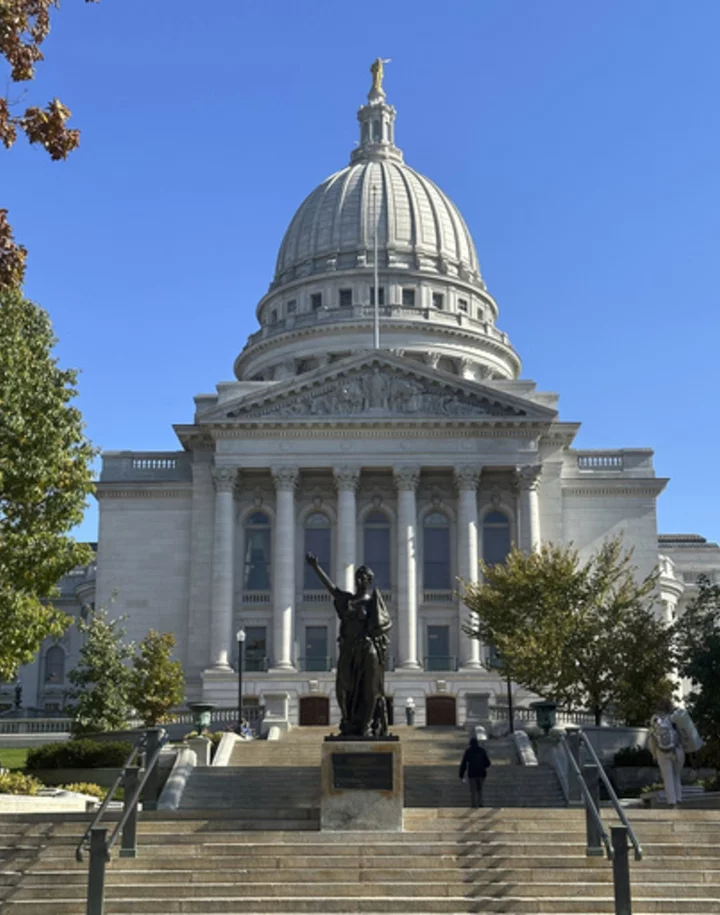Former President Donald Trump keeps telling the lie that he won Georgia in the 2020 election. This weekend, he delivered a new false claim in support of that old false claim.
Trump's deception about what happened in Georgia has not relented even as he prepares to turn himself in this week to face charges in Fulton County over his efforts to overturn his 2020 defeat to Joe Biden. On Saturday, he posted on social media that despite having won Georgia in 2016, doing a "fantastic job" as president and earning millions more votes in 2020 than he did in 2016 and more votes than a sitting president had ever received before, he had "shockingly, 'LOST' Georgia" -- putting lost in quotation marks.
Trump then continued, "All this despite winning nearby Alabama and South Carolina in Record Setting Landslides." He concluded the post: "Does anybody really believe I lost Georgia? I DON'T!"
Facts First: Trump lost Georgia fair and square in 2020, by 11,779 votes, and his claim that he won South Carolina and Alabama in record landslides is not even close to true. Numerous previous candidates have earned far larger margins of victory in South Carolina and Alabama than Trump did in 2020. Even Trump himself won each state by a larger margin in 2016 than he did in 2020 -- a fact that contravenes his insinuation that his 2020 failure in Georgia was mysteriously at odds with a better-than-ever performance elsewhere in the region.
The decline in Trump's Georgia margin between 2016 and 2020 (about 5.4 percentage points) was larger than his declines in South Carolina (about 2.6 points) and Alabama (about 2.3 points), both of which he won big in both elections, but that does not suggest that anything nefarious happened in Georgia. States are simply different. Adjacent states often have social, economic and political differences that can lead to divergences in their voting habits.
Audrey Haynes, a University of Georgia political science professor, called Trump's reasoning "simplistic and faulty." She said in a Sunday email: "That statement assumes that those states are so similar that they would produce the same outcome. But they aren't identical. And they did not produce identical results."
There are various other sets of neighboring states where the election results diverged between 2016 and 2020. For example, Trump lost Minnesota by about 7.1 points in 2020 (about 5.6 points worse than in 2016) while winning neighboring North Dakota in 2020 by about 33.4 points (only about 2.4 points worse than in 2016). That's not a sign that something nefarious occurred in Minnesota. Again, those two states are just not identical.
We'll outline some of the key distinctions between Georgia, South Carolina and Alabama in a moment. First, we'll thoroughly debunk Trump's claim that he won by "Record Setting Landslides" in South Carolina and Alabama in 2020.
The facts about South Carolina
Trump won South Carolina in 2020 by about 11.7 percentage points. That was a decline of about 2.6 percentage points from his own 2016 margin in the state (about 14.3 points), so it obviously wasn't a "Record Setting Landslide" even for Trump himself.
And his 11.7-point margin in 2020 was nowhere near record-setting even if you don't count 2016.
Franklin D. Roosevelt won South Carolina by about 96 percentage points in 1932 and then topped it with a margin of about 97 points in 1936. Before Roosevelt, Democratic candidates won South Carolina by more than 82 points in all eight presidential elections from 1900 through 1928.
Looking at more recent outcomes, Trump's 11.7-point margin in the state in 2020 was smaller than the margin earned by the state winner in 7 of the 14 presidential elections from 1960 through 2012: George W. Bush in 2000 (about 16 points) and again in 2004 (about 17 points), George H.W. Bush in 1988 (about 24 points), Ronald Reagan in 1984 (about 28 points), Jimmy Carter in 1976 (about 13 points), Richard Nixon in 1972 (about 43 points) and Barry Goldwater in 1964 (about 18 points).
The facts about Alabama
Trump won Alabama in 2020 by about 25.5 percentage points. That margin was a rounded decline of about 2.3 percentage points from his 2016 margin (about 27.7 points), so, again, clearly not a record.
And Trump's 2020 margin was vastly exceeded by Roosevelt, who earned a roughly 74-point victory in the state in 1936 and never had an Alabama margin less than 63 points between 1932 and 1944. Woodrow Wilson's margins in the state also exceeded 50 points in both 1912 and 1916.
More recently, Trump's 25.5-point margin was narrowly beaten by George W. Bush's Alabama margin in 2004 (about 25.6 points) and handily beaten by Nixon's margin in 1972 (about 47 points).
States aren't the same
There is no evidence that Georgia or any other state had anywhere close to enough fraud in 2020 to have changed the winner. After Trump promised last week to hold a news conference this Monday to reveal supposedly "irrefutable" evidence of 2020 fraud in Georgia, he later called off the event and posted that his lawyers wanted him to put the so-called evidence in legal filings instead.
So why, if not fraud, would there be a bigger decline in Trump's Georgia margin between 2016 and 2020 than there was in his South Carolina and Alabama margins between 2016 and 2020? Because they are different places that are experiencing different sociopolitical trends.
Georgia became substantially more racially diverse in the decade leading up to the 2020 election in large part because of an influx of residents to Atlanta and its suburbs, experiencing spikes in its Black, Latino and Asian populations at the same time as a small decline in its number of residents identifying as White alone; South Carolina and Alabama experienced far less racial diversification over the same time period. Across the country, Black, Latino and Asian voters tended to vote for Biden in 2020, while White voters tended to vote for Trump.
Georgia had a higher percentage of 2020 residents with at least a bachelor's degree than either South Carolina or Alabama; Democrats made major inroads with college graduates between 2016 and 2020. Georgia also had a younger population in 2020 than either South Carolina or Alabama; Democrats also made a major improvement with voters age 18 to 29 between 2016 and 2020.
There were numerous additional factors at play, too many to list here. For one, Georgia was the focus of an intensive Democratic voter registration and persuasion effort in the years leading up to the 2020 election that did not have an equivalent in South Carolina or Alabama.









